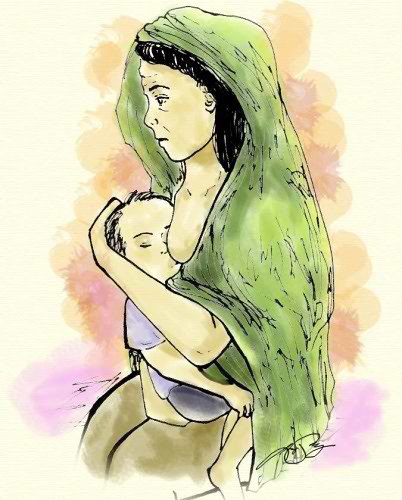WHY BREAST MILK IS BEST The Department of Health list the following benefits of breast milk: 1. It helps protect the baby against diarrhea, cough, colds, malnutrition, and other common illnesses. 2. There is no need to prepare breast milk. 3. It is always available at no cost. 4. It helps babies grow up with a close bond to their mother. 5. It is easy to digest. 6. It is clean and has the right temperature. OTHER IMPORTANT INFORMATION 1. Mothers should continue breastfeeding sick babies. 2. A sick mother can still breastfeed her baby. 3. Breastfeeding mothers should eat nutritious food to become stronger.
Read more information here. Instead of canned goods and used clothes, a team of doctors from the University of the Philippines–Philippine General Hospital is bringing a unique donation when they embark on a relief mission to “Ondoy" evacuation centers: breast milk for babies. Dra. Maria Asuncion Silvestre, head of the PGH Lactation Unit and Milk Bank, said the medical mission aims to help breastfeeding mothers cope with the stress from the massive floods that ravaged their houses and, more importantly, to prevent the spread of diseases among infants. Silvestre likens breast milk to a “vaccine" that can protect infants from sickness especially in disaster and emergency situations. On Friday, the UP-PGH will have its initial mission at the Kabisig Elementary School in Cainta, Rizal, one of the areas devastated by widespread flooding from Ondoy last Saturday.

Illustration by Analyn Perez
Silvestre said the news of infants catching diarrhea and pneumonia in evacuation centers prompted the PGH Newborn Medicine department and some of its partner organizations to educate mothers on how to breastfeed properly during times of crisis. She discouraged donors from giving infant formula to the evacuees, saying this may bring more harm than good. Even raw breast milk that has not been pasteurized is safer than formula milk, the doctor said. “In disaster areas, it’s very restricted. The centers can be unsanitary, they have no clean water. They have no way to boil (sterilize) the milk bottles. Formula milk can be contaminated because there are many sources for contamination," Silvestre explained. More than
half a million people have sought refuge in 726 evacuation centers, where disease and crowded conditions are major concerns. According to the Department of Health, breastfeeding provides the greatest protection for infants who are most vulnerable to disease and death in emergency situations. Because of limited access to drinking water, fuel and utensils – necessities in bottle-feeding – infants and children are at risk for diarrhea. In 2009, the DOH listed diarrhea as the tenth leading cause of deaths among infants. “This is the PGH’s emergency response to the disaster. Our first priority is to support breastfeeding moms, to educate them, to reenergize them, so that when the mission leaves, they can continue breastfeeding," Silvestre said in a phone interview with GMANews.TV.
How mothers can help The medical team is also asking for breast milk donations. Silvestre said breastfeeding mothers who wish to help can go to the PGH to express their milk or donate frozen breast milk at the Lactation Unit and Milk Bank of the Newborn Medicine Department of the PGH along Taft Avenue in Manila. As of Thursday noon, the relief mission had collected more than 100 liters of breast milk. For the breastfeeding mission in Cainta, infants up to six months old will be cup-fed by volunteers from the medical school. “The breastfeeding moms will proceed to our designated area where they will be given some refreshments and Vitamin A. Some of them will be given breastfeeding t-shirts and they will be educated on how to sustain their breastfeeding, even though they are stressed and tired," Silvestre said. The t-shirts, drinking water, and a cargo of pasteurized breast milk will be provided by mother-support groups like Mommy Matters and Latch. Five wet nurses, or mothers who breastfeed children that are not their own, from the support group Arugaan are also joining the mission. Through the endeavor, Silvestre hopes to provide mothers with the necessary knowledge in caring for infants in disaster situations. “If the (breast milk) supply for that evacuation center is gone, at least moms can continue breastfeeding their babies. The mission is not meant to be a dole-out; it’s meant to have a multiplier effect," she said. –
GMANews.TV 
